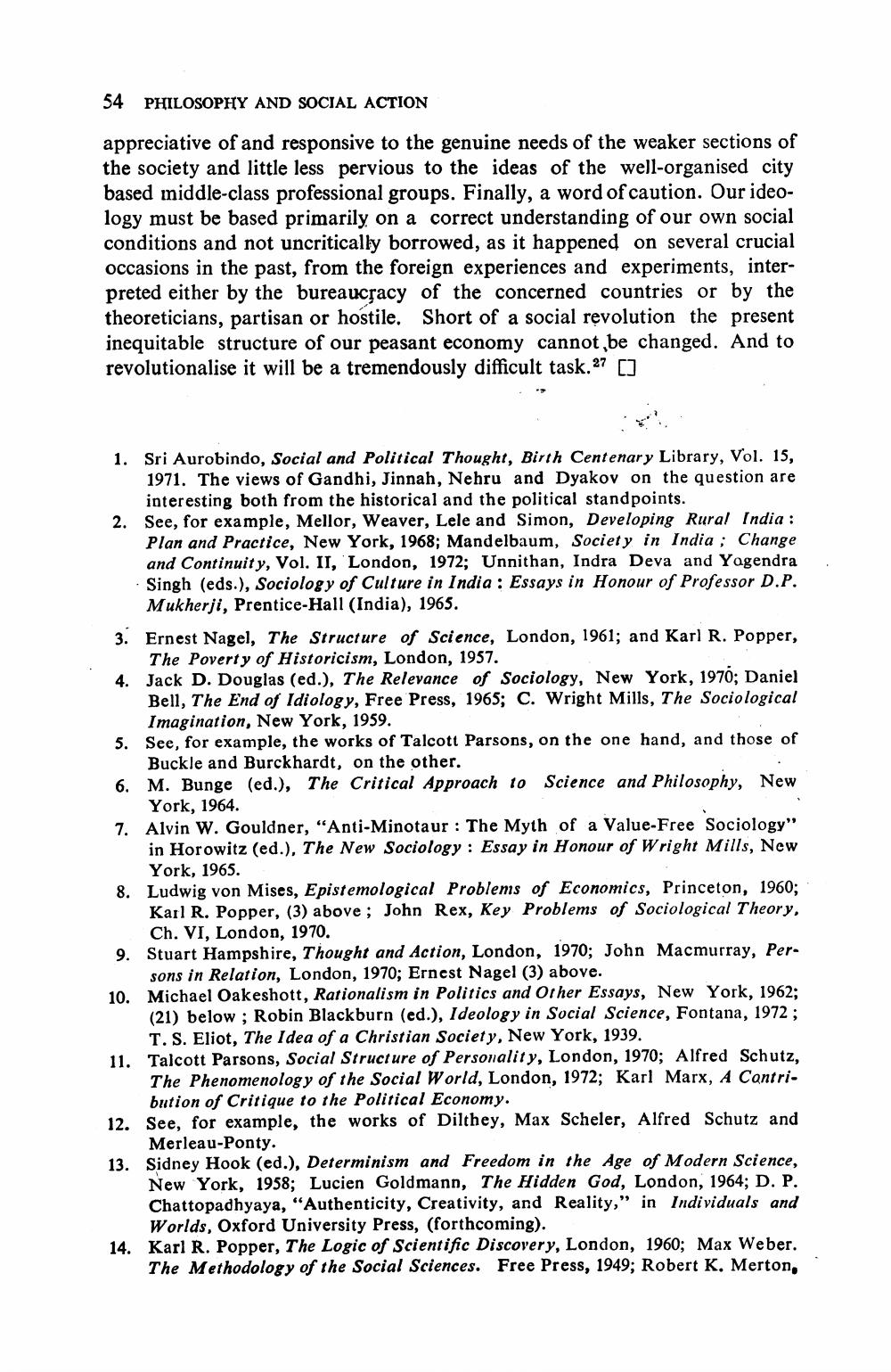________________
54 PHILOSOPHY AND SOCIAL ACTION
appreciative of and responsive to the genuine needs of the weaker sections of the society and little less pervious to the ideas of the well-organised city based middle-class professional groups. Finally, a word of caution. Our ideology must be based primarily on a correct understanding of our own social conditions and not uncritically borrowed, as it happened on several crucial occasions in the past, from the foreign experiences and experiments, interpreted either by the bureaucracy of the concerned countries or by the theoreticians, partisan or hostile. Short of a social revolution the present inequitable structure of our peasant economy cannot be changed. And to revolutionalise it will be a tremendously difficult task.27 []
1. Sri Aurobindo, Social and Political Thought, Birth Centenary Library, Vol. 15, 1971. The views of Gandhi, Jinnah, Nehru and Dyakov on the question are interesting both from the historical and the political standpoints.
2. See, for example, Mellor, Weaver, Lele and Simon, Developing Rural India: Plan and Practice, New York, 1968; Mandelbaum, Society in India; Change and Continuity, Vol. II, London, 1972; Unnithan, Indra Deva and Yogendra Singh (eds.), Sociology of Culture in India: Essays in Honour of Professor D.P. Mukherji, Prentice-Hall (India), 1965.
3. Ernest Nagel, The Structure of Science, London, 1961; and Karl R. Popper, The Poverty of Historicism, London, 1957.
4. Jack D. Douglas (ed.), The Relevance of Sociology, New York, 1970; Daniel Bell, The End of Idiology, Free Press, 1965; C. Wright Mills, The Sociological Imagination, New York, 1959.
5. See, for example, the works of Talcott Parsons, on the one hand, and those of Buckle and Burckhardt, on the other.
6. M. Bunge (ed.), The Critical Approach to Science and Philosophy, New York, 1964.
7. Alvin W. Gouldner, "Anti-Minotaur: The Myth of a Value-Free Sociology" in Horowitz (ed.), The New Sociology Essay in Honour of Wright Mills, New York, 1965.
8. Ludwig von Mises, Epistemological Problems of Economics, Princeton, 1960; Karl R. Popper, (3) above; John Rex, Key Problems of Sociological Theory, Ch. VI, London, 1970.
9. Stuart Hampshire, Thought and Action, London, 1970; John Macmurray, Persons in Relation, London, 1970; Ernest Nagel (3) above.
10. Michael Oakeshott, Rationalism in Politics and Other Essays, New York, 1962;
(21) below; Robin Blackburn (ed.), Ideology in Social Science, Fontana, 1972; T. S. Eliot, The Idea of a Christian Society, New York, 1939.
11. Talcott Parsons, Social Structure of Personality, London, 1970; Alfred Schutz, The Phenomenology of the Social World, London, 1972; Karl Marx, A Contribution of Critique to the Political Economy.
12. See, for example, the works of Dilthey, Max Scheler, Alfred Schutz and Merleau-Ponty.
13. Sidney Hook (ed.), Determinism and Freedom in the Age of Modern Science, New York, 1958; Lucien Goldmann, The Hidden God, London, 1964; D. P. Chattopadhyaya, "Authenticity, Creativity, and Reality," in Individuals and Worlds, Oxford University Press, (forthcoming).
14. Karl R. Popper, The Logic of Scientific Discovery, London, 1960; Max Weber. The Methodology of the Social Sciences. Free Press, 1949; Robert K. Merton,




